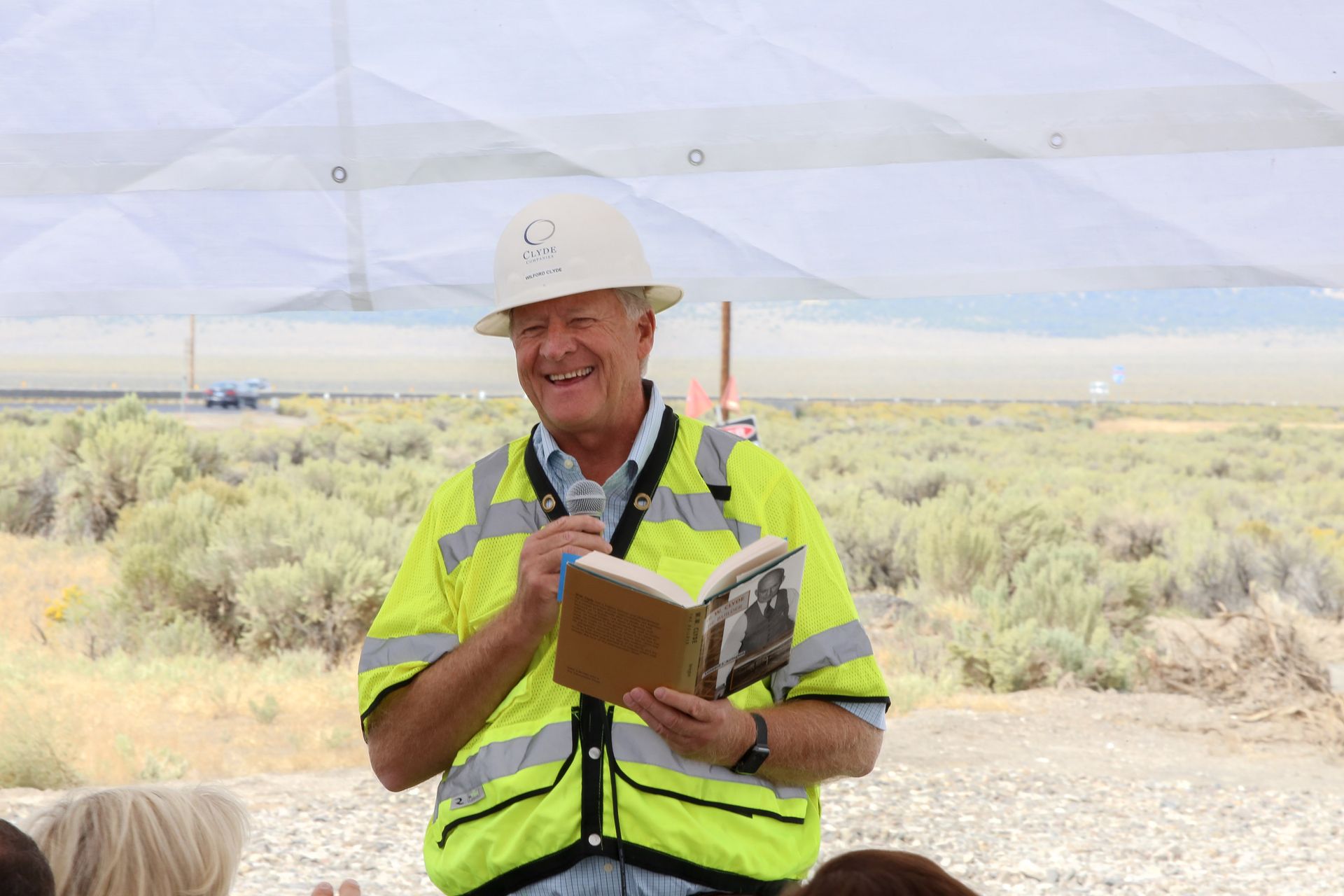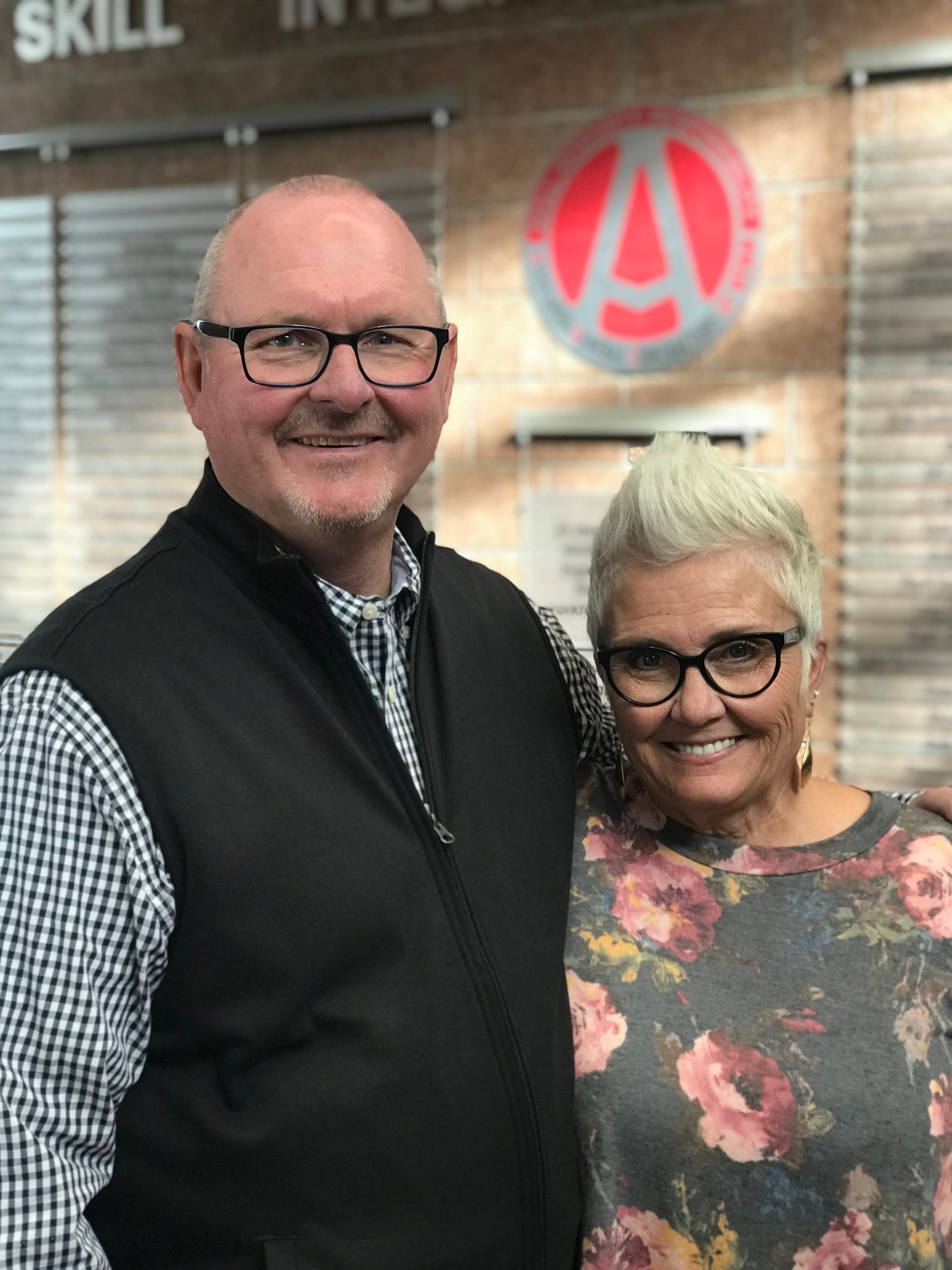Industry Legends

Perhaps it was destiny that former Clyde Companies CEO Wilford W. Clyde’s impact on Utah’s construction industry would rival that of his grandfather—the man he was named after, and the founder of the longtime Utah County-based firm that bears his name, one Clyde led to great heights as its top executive for 20 years of his overall stellar 45-year career. Or perhaps it was sheer ambition and hustle to do the very best job he could do, regardless of what role he served within the company, which under his watch has exploded into a multi-faceted behemoth with eight major subsidiary firms that boast nearly 5000 employees and collectively haul in $2.5 billion annually in revenues—eye-popping numbers by any metric. “Once I made the decision to come work here, I went at it, full steam,” said Clyde, who turned 70 in January and officially retired on February 3, after two years of working “half-time” as the company gradually transitioned the leadership to Jeremy Hafen, 48, an 18-year company veteran who was formally named CEO of Clyde Companies in December 2022. Clyde will retain his title of Chairman of the Board and continue offering input on major company decisions through 2027. He admits to not quite knowing what to make of retirement just yet, other than spending more quality time and traveling with his wife, Natalie, and family, and continuing to contribute to community and philanthropic efforts such as “Springville Rising”, a program aiming to revitalize his hometown’s historic downtown area. Clyde’s public service to Springville is legendary, with two terms as Mayor (2009-2017) and multiple years on the City Council, not to mention (10) years (hundreds of games) coaching his four daughters in softball. “It’s hard when you’ve been coming to work for 45 years,” said Clyde, wistfully, about calling it a career. “It’s hard because you have all these relationships. But it’s time. I’m still going to have some involvement in special projects like the history of the company […] and be involved in some philanthropic efforts […] and key decisions like acquisitions and other strategic decisions.” In the Genes Clyde grew up in Springville, across the street from his grandparents, mowing their lawn and performing other yard work as a teen. He described his grandfather as “kind of gruff,” a bit intimidating, and particularly good at “micro-managing you in the yard”. Clyde spent every summer in high school working at one of the family businesses—Utah Service (now Sunpro) in the supply warehouse and on Geneva Rock and WW Clyde construction crews. He didn’t have a lot of personal interaction with his grandfather, W.W. Clyde, about the family business until after he had returned from a church mission to New Zealand, and his grandfather sat him down for their first real conversation about life. “He just said to me, ‘There’s a lot of money to be made in the construction business,” Clyde recalled. “Integrity and honesty were really important to him. If you said you were doing something, you did it.” Clyde earned a Bachelor of Accounting from Brigham Young University in June 1977 and considered pursuing a CPA career over working at one of the family businesses and following in his father Blaine’s footsteps, in part because he wasn’t confident about the long-term outlook of the company ladder and where he fit in the family pecking order. “I had some older cousins and uncles in the business, so I thought I’d be one of the younger ones and maybe wouldn’t get the same opportunities (for advancement) because they were ahead of me,” Clyde said. Blaine, who served as President of WW Clyde from (1981-86), took him for a ride up the canyon one day to set his son straight, ensuring the younger Clyde the family business would provide plenty of chances to prove his worth. Clyde became Geneva Rock’s first full-time accountant in 1977, a job he did for five years prior to working in the field and in operations in 1982. He was promoted to General Manager in 1983 at the youthful age of 30 and President of Geneva Rock in 1988, a title he held until being named President of Clyde Companies in 2001 (CEO in 2002). Clyde’s promotion to President of Geneva Rock was bittersweet, as Blaine had passed away a year earlier at age 70 in July 1987 from bone cancer, just a year after he had finally retired.

For over two decades, General Manager Tage Flint was the man steering the ship at Ogden-based Weber Basin Water Conservancy District (WBWCD). He proved to be a steady guide through explosive population growth as he oversaw dozens of vital construction projects in the five counties and nearly 750,000 residents that the district serves. Flint announced his retirement at the beginning of this year, capping a 21-year run as GM who followed his father, Ivan Flint, whose quarter-century of service included 15 years as GM from 1986 to 2001. “The time was right,” said Flint, who plans to later pick up part-time consulting work. “We joke that it’s not the age of the car as much as the miles on it. Very few people get to 21 years at this post. If I wanted a 60-hours-a-week job, I could have stayed where I was. It [was] time to do something else.” Rooted in Water The combined 45-year period of district leadership is an impressive stretch of time for the Flint father-son duo, whose familial roots run deep in Davis County, dating back to early Latter-day Saint pioneers who settled the area in 1853. The Flints even lived on Flint Street in West Kaysville, on a road named for their ancestors, including some of the earliest Davis County farmers who built canals and other early water infrastructure systems to ensure their crops would be sufficiently watered. “So many of the old water rights were held by these old pioneer water companies,” said Flint. “What farms are left are still using those same systems.” Call it destiny, but Flint was groomed from an early age to work in the water conservancy field. Ivan, who passed away in 2017, was a defense contract specialist on federal military contracts for the Dept. of Natural Resources before spending 24 years at WBWCD (1977–2001). “I grew up visiting dams and spending weekends at spillways during flood years—that certainly steered me towards that background,” said Flint, who graduated from Davis High in 1980, received a Bachelor of Civil Engineering from the University of Utah in 1987, and ultimately earned an MBA from Western Governors University in 2003. “I was one of those ‘STEM’ kids—math and science came easy and interested me, and I thought I’d do something in that field. By the time I was 15 I would work summers doing landscape work and light construction on canals and diversion structures, and it all just fascinated me—how water moved around. Most people have no idea where water comes from. There is a lot to it.” Flint worked at Jordan Valley Water Conservancy District from 1987–2001, serving under former GM Richard Bay in several capacities, including as co-GM with Bay. “He was a mentor of mine throughout,” Flint said. When Ivan was retiring, it never occurred to him to apply for the position. “I was happy at Jordan Valley. I got a call from a (WBWCD) board member if I was interested; they were looking for candidates.” During Flint’s 21 years as GM, the population in the five counties serviced by the District (Weber, Davis, Morgan, Summit, and part of Box Elder) more than doubled. Today, WBWCD delivers 230,000 acre-feet annually to customers, including every city in Davis and Weber counties sans North Ogden. “The corresponding demand for drinking water has gone up,” said Flint. “Development, policy, water rights and infrastructure have grown exponentially and in complexity in that time. It really is a different place. We have twice as many employees—everything has been in accelerated growth mode.” WBWCD, which was established in 1950, has done a “tremendous amount of work on aging infrastructure,” Flint added, with seven major storage reservoirs along the Ogden River and Weber River as part of its stewardship, along with three hydro-power generation plants, 21 wells, four water treatment plants, and hundreds of miles of canals, tunnels, aqueducts, and pipelines.

“Ross is the epitome of a great boss. He’s very level-headed, very deliberate with the thought process, so it made him a stabilizing force in our firm. Often times he would play devil’s advocate just to make sure we’re not all a bunch of yes men. That happened many times, just trying to shake things up if he thought we were being too comfortable with our decision.” — Chris Lund

C apitalizing on his family’s good name—and his own gregarious, optimistic nature and personal charm—Rich Thorn has been among the most prominent advocates of Utah’s construction industry for more than 40 years. As the President/CEO of the Associated General Contractors (AGC) of Utah, Thorn has been the proverbial face of the association since assuming the title of its top executive in October 1982—just before reaching 25 years of age. It has proven to be a role tailor-made to his skills, education, and upbringing. “Every day is a great day,” Thorn exclaimed during an early February phone call to discuss how he was feeling after AGC of Utah’s 100th-anniversary convention. Besides it being the coveted century mark in time, this year's event was particularly special to Thorn due to the remarkable turnout and energy level of those who attended. “Our numbers [of attendees] were above those of pre-Covid numbers, and couple that with the companies who were sponsors, we were really happy with the turnout,” he said. It was also significant in that it was his second-to-last AGC convention, as Thorn, 65, recently announced his retirement, effective at the end of the state’s legislative session in March 2023. “I’d be less than honest if I didn’t feel some bit of nostalgia,” he said. “This is the next to last one; there is a lot of sentimental value, as I’ve been through a lot of these.” Over the past couple of years, Thorn has been gradually handing over the reins of the chapter to long-time AGC of Utah Vice President Joey Gilbert, with Melissa Camp, Director of Finance and Administration, also filling a vital staff role. Gilbert and Camp were hired in 1997 and 2003, respectively, and have more than 40 years combined experience, yet are acutely aware it’s going to be challenging filling Thorn’s shoes. “He’s the eternal optimist, liked by everyone,” said Gilbert, trying to sum up Thorn’s character in a few words. “He’s always upbeat and treats everyone like a best friend. I get that comment all the time.” “I’ve been trying to convince him not to leave,” laughed Camp. “He cares—that’s the biggest thing. And cares not just professionally, but about your personal life. We’re calling this his ‘farewell tour.’ It’s hard for him 100% to step back, but he’s trying. He’s trying to take it all in and enjoy it.” Ideal Upbringing included Construction and Politics A native of Springville, a relatively small Utah town with a rich history of heavy/civil contractors, Thorn was born into a prominent construction family. Great-grandfather Ashel O. Thorn started Thorn Construction in the 1920s, with grandfather Paul Thorn (AGC of Utah President in 1947) and great-uncle Grant Thorn also running the firm for many years, before it closed in 1981. His father, James (Jim) Thorn, worked at the company for many years as a laborer, heavy equipment operator, foreman, and superintendent/project manager. Fond memories from Rich’s youth include staying at motels during the summer in towns like Orderville in southern Utah and Delle in Utah’s west desert, while Jim managed paving jobs. Thorn spent summers in high school and college working at Thorn Construction, learning how to operate loaders, dozers, and asphalt pavers—great hands-on experience of what happens in the field. “For me, that’s always been helpful because I can relate to what that’s like,” he said. “I will never forget the guy wallowing in the mud, laying pipe, making it happen on the job site. That’s where the work gets done.” One powerful early memory came via a job site visit with Grandpa Paul, on a day with rather inclement weather. “It was a lousy, rainy, bad day,” Thorn recalled. “We pulled onto the job and Grandpa Paul was the executive. He was wearing brand new Florsheim shoes. He got out of the car and walked through the mud to shake the ‘Cat skinner’s hand. I will never forget that. He saw the value of the people he worked with, and that’s the term, he worked with them. The Thorn name meant a lot in the construction industry; our company had a good reputation.” On the flip side, his mother, Karen, was perhaps even more influential on Thorn, given her vast political clout and lengthy career that included working for two U.S. Congressmen and two U.S. Senators for 35 combined years, in addition to serving on multiple community and political organizations. She was sharp, with an infectious smile and a keen ability to connect with people of all persuasions. Karen’s career included working in Washington D.C., which uprooted the family from tiny Springville and had them living in the nation’s capital from 1961–1964, Thorn’s first three years in elementary school. The experience was magical for young Rich, with “family field trips” most weekends to different historical U.S. sites. He’s been to D.C. dozens of times throughout his professional adult life. He cites D.C. as perhaps his favorite city. “He’s his mother, through and through,” said Thorn’s wife of 43 years, Sherrie. “He’s got his dad’s [gift of gab] skills—he likes to talk—but he’s got his mom’s kindness. His mom was just genuine.” Karen’s ties helped Thorn effectively navigate Utah’s political waters at an early age, and his 40 years of lobbying on Utah’s Capitol Hill has been consistent and effective, year after year. He’s been resigning from various labor and pension boards and other workforce and industry committees (upwards of 15-plus during peak years) while having Gilbert step in to fill the void. “It’s all part of the plan,” Thorn said. “It’s flattering to be called by the Governor to serve on a board or as a chair of a committee. I feel obligated to serve and I’ll give it my best. It’s nice to have people ask for your opinion.” Thorn remains engaged in this year’s legislative session, having been to Capitol Hill three times, and is reading legislation, giving input, and suggesting amendments while Gilbert is running point. “I’m up there as his wingman,” said Thorn. “We talk every day. That’s part of the [transition] process. It’s been a bit of a learning curve for me to sit back.” Family First Thorn said the single greatest benefit of working for the AGC, for himself and Sherrie, was being able to comfortably raise their family of four children. They met at Dixie College in 1976—Thorn was on scholarship playing football and baseball—and married in June 1978. In the fall of 1980, he got wind of a staff assistant position at AGC of Utah and was hired to work under Horace (Hod) Gunn on September 15. It proved to be a great fit, with Thorn’s construction background and jovial nature making him an instant asset to the association. When Gunn announced his retirement less than two years later, both Thorn and his wife felt he was ready to take over as AGC’s top executive. They weren’t sure the Executive Committee and Board of Directors felt the same way about a 25-year-old, but they were optimistic at his chances, nonetheless. “We were hoping and praying he’d get it,” recalled Sherrie, “but he still had to compete with everyone else. He had an advantage because he had the [staff assistant] job for two years. He was a young buck, but he had the family name and he loved the job. He was a perfect fit.” Thorn remembers interviewing with the search committee, including Walter Christiansen, Allen Young, John Tempest, and committee chair Ted Jacobsen. They told him, “We’re going to give a young guy a chance,” according to Thorn. “I believe the Thorn name and my mom’s political prowess neutralized the ‘He’s too young’ discussion. I knew a lot of [AGC] members on a first-name basis before I ever walked in the door. I also brought something they recognized—potential.” He was named Executive Manager (later called Executive VP, then President/CEO in 2000) in October 1982 and poured his soul into the job. The construction industry was struggling at the time, with Utah and the US still reeling economically from the fallout after the Savings and Loan crisis. “Life from September to January, they are so busy,” Sherrie said about convention prep. “It’s just nuts. It’s a lot of work for Rich, Melissa, Joey, and the staff. It’s crazy. That ends, and lobbying at the Capitol begins. Lobbying is not so bad now, but back in the day, Rich was (at the Capitol) morning, noon, and night.” She credits Camp and Gilbert for their hard work and contributions to making the association better over the past two-plus decades. “Rich couldn’t have done it without them,” she said. “They are his right and left hand—they’re a team.” Chips Off the ‘Ol Block Thorn’s three sons—Cody, Brady, and Tyler—all ended up pursuing careers with ties to the construction industry, and speak glowingly of their father’s impact on their respective success. “Everything I do has been by observing how my dad handles and treats people,” said Brady, Sr. Vice President at Murray-based Beehive Insurance. “As a result of that, my career has been very successful. I believe in the ‘Golden Rule’—you treat the janitor and the CEO with the same level of respect. People like it when they are appreciated and valued. I know my clients’ wives and friends, their victories and successes.” “I was literally raised by the AGC,” said Tyler, Area Manager for Bridge Source. “I’ve attended conventions, conferences, and golf tournaments in a stroller, and now I attend those same functions with my wife, and we’ve taken our babies to conventions.” Tyler continued, “From a son’s perspective, he has always been a selfless person. He was always available, always willing to help. You can tell that work meant a lot to him and he was good at it, but we were the top priority. He would move heaven and earth to go to anything we did—scout camps, baseball tournaments, everything. He’s available if I need to bounce an idea off him, but we always talk about other things …sports, politics. He’s well-rounded in that regard.” “His support has been amazing with me starting a new company,” said Cody, who founded Thorn Milling & Construction in 2018. “I reached out to him many times if I was having a hard time with a particular project. He’s always told me to be calm and collected and keep your composure. People jump to conclusions way too quickly. Treat people the way you want to be treated, and surround yourself with people who will make you a better person.” Cody added, “I’ve never seen dad lose his cool. Also, when it comes to his leadership role at AGC, people look up to him. They learn from him. When he speaks, he demands your attention. Plus, he’s a phenomenal listener.” Thorn said he’s proud of his sons’ career accomplishments thus far, and also wanted to give a shout out to his daughter, Shelbie, and her husband, Chris Curtis. Shelbie and Chris are the proud parents of three children and reside in Salt Lake County. Shelbie said her father’s strong work ethic and ability to make friends are among his hallmarks, but “work was work, family came first.” As she got to be a teenager and hanging out with friends, her dad used to tell her “remember who you are. It’s just stuck with me. I’m a Thorn and we take pride in our name. I’m doing that now with my kids.” A Legacy of Excellence The AGC has long attracted the “best of the best” from Utah-based general contractors to lead the chapter, including company owners, presidents, CEOs, and other high-ranking executives that fill various executive committee and board of director positions annually. So Thorn, needless to say, has worked with hundreds of talented, influential people over the years, spanning every type of construction—from general builders to highway and utility contractors, and everyone in between. Praise for his inclusive nature and effectiveness as the chapter’s long-time leader is found in spades. “He’s an ‘A-game’ type of guy—and he does it with a smile on his face,” said Bob Tempest, former Vice President for Murray-based Tempest Enterprises, and a long-time advocate of AGC of Utah who served as Chair in 2011, and as a Lifetime Director for a decade. “Rich has always demonstrated that he’s in the service of the industry,” said Tom Case, former Granite Construction executive and 2005 AGC of Utah Chair, who now operates TCM Services in Park City. “It’s through that service that he adds value to the members, and it’s why people keep coming back.” Case, who also served as Director of the Highway/Transportation Division for AGC of America in 2014, said Thorn’s impact is recognized nationally by other chapters. “I got to see other [AGC] chapters and how they do things, and I would say Utah is one of the best in the country, and that is a direct reflection on Rich, Joey, and the team.” “To his fellow chapter executives, he is always willing to share what he and the Utah AGC does that is successful. At the same time, he’s not hesitant to listen and learn about what others are doing and bring that back to Utah,” said Ken Naquin, CEO of the AGC of Louisiana. “Rich has that innate sense of what makes an individual special and recognizes how to engage that talent. Rich has always positioned Utah AGC to be supportive of AGC of America—that is not easy to do.” “I’m impressed with the network of people he cultivates and the relationships he maintains,” said Scott Parson, CEO of Staker Parson Materials & Construction of Ogden and 2022 AGC of Utah Vice Chair. “The construction industry is all about connection and relationships, and Rich epitomizes that.” “Rich is one-of-a-kind and so focused on making our industry better,” said Rob Moore, Executive Chairman for Salt Lake-based Big-D Construction and 2010 AGC of Utah Chair. “He gets things done. He knows who to tap and who to talk to.” “It’s easy to say good things about Rich,” said Doug Welling, former President/CEO of Jacobsen Construction of Salt Lake City and 2018 AGC of Utah Chair. “Rich has been interested, capable, invested, and energetic about our industry for many years. He never gets tired, never gets offended. He’s always at the forefront making things happen.” Welling, who also took construction management courses at BYU with Thorn all those years ago, noted that a new slate of leaders is elected each year, and each person who serves as Chair has an agenda. Thorn’s ability to help new leaders maximize their calling is second to none. Doug Watts, the former President/CEO of St. George-based Watts Construction and 2014 AGC of Utah Chair, expressed his appreciation for Thorn’s influence on his personal life. “Rich came into my life at one of my darkest periods [...] and helped me believe I was still relevant,” said Watts. “He is generous, charitable, and never lets anyone down. He has been the best fit to lead the AGC of Utah […] and built it into a powerful, well-respected organization. He is a very good friend.” “There are a lot of unique and wonderful things about Rich,” said Scott Okelberry, Executive Vice President and COO of Orem-based Clyde Companies, who served as 2021 AGC of Utah Chair. “As the President of this organization, he’s unmatched. We go to regional and national chapter leadership meetings and there are a lot of good leaders out there, but nobody stands above Rich Thorn. We’re fortunate in this industry to have a leader like him, somebody with his level of experience, his personality, his assertiveness, and his vision of this association. As he prepares to ride off into the sunset in just over a year, we have a very capable successor in Joey Gilbert, who is fully ready to take the reins.” “It is difficult to imagine AGC and our Utah chapter without Rich,” said Stephen Sandherr, CEO of AGC of America. “He is such a tremendous force of nature, constantly plugging away at his job with his sunny disposition. He has definitely helped shape our association for the better, and is one of our better known and widely-respected chapter leaders. Filling his shoes won’t be easy, but if there is one thing we have learned about the AGC of Utah, there is no challenge too big for the chapter to overcome.” Thorn was wistful in trying to sum up his AGC career. “This has been a part of my genome for two-thirds of my life,” he said. “It’s filled with great memories. There will be some things I’ll miss. But I’ll look back and say we accomplished some pretty good things. I was the luckiest guy ever in that I got to do a job I absolutely loved.”



















